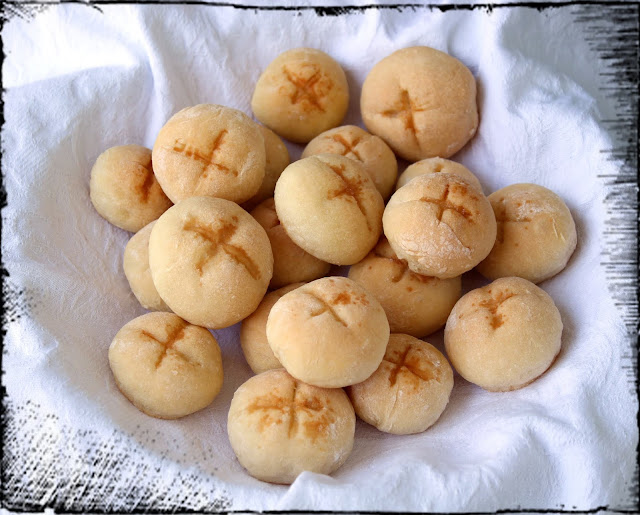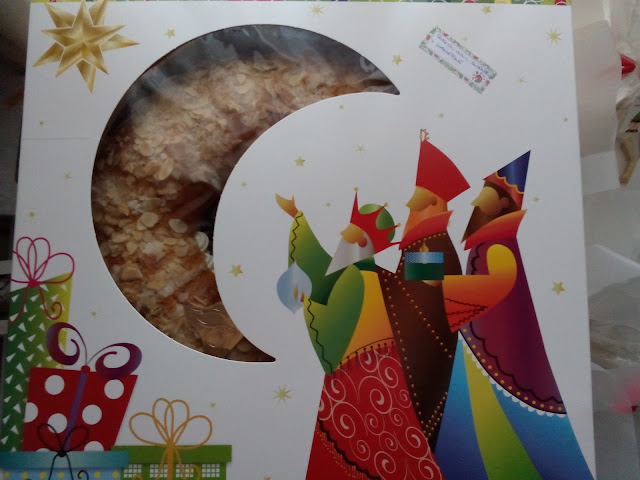Patatas a la importancia / "A la importancia" potatoes
El pasado julio asistí a unas jornadas sobre flora amenazada que organizaba el Ayuntamiento de San Esteban del Valle y SEBiCoP. Os preguntaréis a qué viene esto, fácil. A ello voy.
Como casi siempre voy sola, termino hablando con todo el mundo.
El caso es que casi siempre surje el tema de las comidas en las salidas al campo.
Lo mio es sencillo, suelo llevar una tartera con verduras cocidas (este día llevaba una ensalada de judías verdes con tomates cherry de la huerta de mi padre) y algo de fruta.
Como casi todos llevaban un bocadillo y unas piezas de fruta, nos pusimos a hablar de como íbamos al campo y de las cosas que se metían en las alforjas. Uno de los platos que salió en la conversación fueron las "patatas a la importancia". Algo sencillo de preparar, pero contundente.
Eso me recordó a mi abuela. Todos los días se levantaba muy temprano y se ponía a cocinar.
Sobre todo recuerdo los inviernos. En la cocina tenía una chimenea francesa.
Lo primero era colocar la leña (restos de la poda de las viñas o de los olivos) para que se fuera calentando. Después se ponía con ello. Solía utilizar ollas de barro.
Cocinaba realmente bien y tenía mucha paciencia...lo que ahora llamamos "slowfood".
En fin, ya os contaré más.
El caso es que gracias a esa salida me he propuesto desempolvar el recetario de mi abuela y mi madre.
Espero os guste.
Ingredientes:
Receta para 4 personas
Tiempo aproximado de preparación: 50 minutos.
Cómo lo hago:
¡A disfrutar!
Last July I attended a conference on threatened flora organized by the City Council of San Esteban del Valle and SEBiCoP. You will ask what this comes from, easy. Now I tell you.
As usual I go alone, I end up talking to everyone.
The fact is that the subject of the meals in the outings to the field usually arises.
Mine is simple, I usually carry a "sandwich box" with cooked vegetables (this day I had a salad of green beans with cherry tomatoes from my father's garden).
As almost everyone had a sandwich and some pieces of fruit, we started talking about what it was like to go to the field before and the things that were put in the saddlebags. One of the dishes that came out in the conversation were the "patatas a la importancia". Something simple to prepare, but what satisfies.
That reminded me of my grandmother. Every day he got up very early and started cooking.
Mostly I remember the winters. In the kitchen she had a French fireplace. The first thing was to place the wood (remains of the pruning of the vineyards or olive trees) so that it was heated. Then she got on with it. She used to use clay pots.
She cooked really well and had a lot of patience, what we now call "slowfood".
Anyway, I'll tell you more, in the future.
Thanks to this field trip, I have proposed to dust off the recipe book of my mother and grandmother.
I hope you like it.
Ingredients:
Approximate preparation time: 50 minutes.
How do I do it:
Enjoy!
Como casi siempre voy sola, termino hablando con todo el mundo.
El caso es que casi siempre surje el tema de las comidas en las salidas al campo.
Lo mio es sencillo, suelo llevar una tartera con verduras cocidas (este día llevaba una ensalada de judías verdes con tomates cherry de la huerta de mi padre) y algo de fruta.
Como casi todos llevaban un bocadillo y unas piezas de fruta, nos pusimos a hablar de como íbamos al campo y de las cosas que se metían en las alforjas. Uno de los platos que salió en la conversación fueron las "patatas a la importancia". Algo sencillo de preparar, pero contundente.
Eso me recordó a mi abuela. Todos los días se levantaba muy temprano y se ponía a cocinar.
Sobre todo recuerdo los inviernos. En la cocina tenía una chimenea francesa.
Lo primero era colocar la leña (restos de la poda de las viñas o de los olivos) para que se fuera calentando. Después se ponía con ello. Solía utilizar ollas de barro.
Cocinaba realmente bien y tenía mucha paciencia...lo que ahora llamamos "slowfood".
En fin, ya os contaré más.
El caso es que gracias a esa salida me he propuesto desempolvar el recetario de mi abuela y mi madre.
Espero os guste.
 |
| Plato pintado por LilaHexe |
Ingredientes:
- 1 Kg de patatas
- 1 cebolla
- 3 dientes de ajo
- 250 ml de vino blanco
- 250 ml de caldo de verduras
- Preparado para sustituir 2 huevos
- Perejil fresco (yo usé 5 ramas)
- Aceite de oliva virgen
- 1 cucharada de harina + la necesaria para el rebozado (yo usé harina de trigo)
- Una pizca de azafrán
- Sal marina
Receta para 4 personas
Tiempo aproximado de preparación: 50 minutos.
Cómo lo hago:
- Pelamos, lavamos y cortamos las patatas en rodajas gruesas (1 ó 2 cm). Sazonamos.
- En un plato ponemos harina y en otro preparamos el sustituto del huevo.
- Pasamos las patatas primero por el harina y después por el "huevo", es decir, las rebozamos.
- En una satén profunda ponemos a calentar aceite de oliva (tenemos que poner el suficiente para cubrir las patatas). Cuando esté caliente, freimos las patatas.
- Reservamos en una rejilla para que escurran el aceite.
- En el mortero ponemos el ajo, el perejil y una pizca de sal. Majamos. Reservamos.
- Pelamos y picamos la cebolla en trozos pequeños. Reservamos.
- Calentamos un poquito (unas tres cucharadas) de aceite de oliva en una cazuela y rehogamos la cebolla.
- Cuando esté dorada añadimos 1 cucharada de harina y movemos bien para que no forme grumos.
- Añadimos el vino y dejamos que se evapore el alcohol (unos 2 minutos a fuego lento).
- Añadimos el "majado", el caldo de verduras y el azafrán.
- Colocamos en la cazuela las patatas, con mucho cuidado para que no se rompan.
- Tapamos y dejamos cocer a fuego lento 20 minutos o hasta que estén cocidas. Para saber si están listas, pinchamos con una aguja, como en el caso de los bizcochos.
¡A disfrutar!
 |
| Plato pintado por LilaHexe |
Last July I attended a conference on threatened flora organized by the City Council of San Esteban del Valle and SEBiCoP. You will ask what this comes from, easy. Now I tell you.
As usual I go alone, I end up talking to everyone.
The fact is that the subject of the meals in the outings to the field usually arises.
Mine is simple, I usually carry a "sandwich box" with cooked vegetables (this day I had a salad of green beans with cherry tomatoes from my father's garden).
As almost everyone had a sandwich and some pieces of fruit, we started talking about what it was like to go to the field before and the things that were put in the saddlebags. One of the dishes that came out in the conversation were the "patatas a la importancia". Something simple to prepare, but what satisfies.
That reminded me of my grandmother. Every day he got up very early and started cooking.
Mostly I remember the winters. In the kitchen she had a French fireplace. The first thing was to place the wood (remains of the pruning of the vineyards or olive trees) so that it was heated. Then she got on with it. She used to use clay pots.
She cooked really well and had a lot of patience, what we now call "slowfood".
Anyway, I'll tell you more, in the future.
Thanks to this field trip, I have proposed to dust off the recipe book of my mother and grandmother.
I hope you like it.
Ingredients:
- 35 Oz of potatoes
- 1 onion
- 3 garlic cloves
- 250 ml white wine
- 250 ml of vegetable broth
- Prepared to replace 2 eggs
- Fresh parsley (I used 5 branches)
- Virgin olive oil
- 1 tablespoon of flour + the necessary for the batter (I used wheat flour)
- A pinch of saffron
- Sea salt
Approximate preparation time: 50 minutes.
How do I do it:
- Peel, wash and cut the potatoes into thick slices (1 or 2 cm). Season.
- On one plate put flour and on another prepare the egg substitute.
- Pass the potatoes first through the flour and then through the "egg", we coat them.
- In a deep frying pan we put to heat olive oil (we have to put enough to cover the potatoes). When it's hot, fried the potatoes.
- Reserve in a grid to drain the oil.
- In the mortar put the garlic, the parsley and a pinch of salt. Crush everything. Reserve.
- Peel and chop the onion into small pieces. Reserve.
- Heat a little (about three tablespoons) of olive oil in a pot and sauté the onion.
- When it is golden add 1 tablespoon of flour and move well so it does not form lumps.
- Add the wine and let the alcohol evaporate (about 2 minutes on low heat).
- Add the "crushed", the vegetable broth and the saffron.
- Place the potatoes in the pot, very carefully so that they do not break.
- Cover and let them simmer 20 minutes or until they are cooked. To find out if they are ready, prick with a needle, as in the case of cakes.
Enjoy!
 |
| Dish painted by LilaHexe |






Comentarios
Publicar un comentario